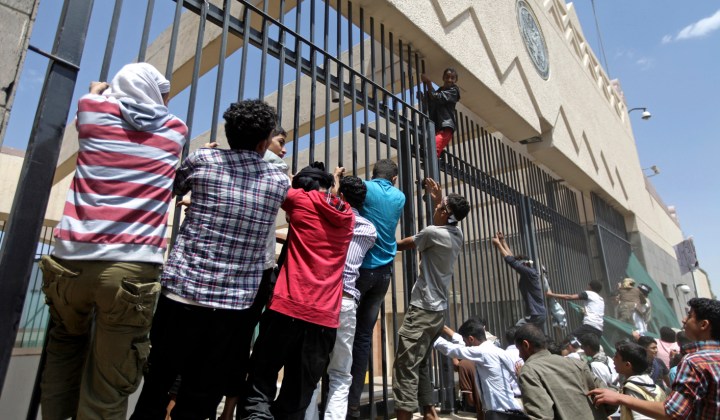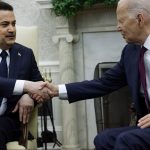World
Middle East’s bloody round two: US Embassies as the new front line

The optimism of the Arab Spring has given way to the muddle that comes when long-simmering tensions meet new-found freedoms – and some bigot thousands of miles away throws a match on an incendiary region. By J BROOKS SPECTOR.
And now, suddenly, it seems we must prepare for the ugly, more discordant B Side of the Arab Spring. A year and a half ago, the world seemed mesmerised by the possibilities of the Arab Spring. Spreading outward from the death agonies of one vegetable vendor in Tunisia, the breaking open of societies trapped in political amber seemed something whose time had finally come to pass – echoing the breakup of the Soviet Union’s empire in Eastern Europe or the end of Apartheid.
The impetus soon jumped from Tunisia’s almost peaceful revolution to Egypt. There the country’s long-running authoritarian president, Hosni Mubarak, was ousted from the combined pressure of public protests and a not-so-gentle shove from the military establishment. But then uprising against Muammar Gaddafi took months of fighting and the intervention of NATO forces under cover of that controversial UN-authorized no-fly zone. The events in the first three countries encouraged protests in Bahrain and Yemen. Most recently, this spirit has ignited an increasingly brutal civil war in Syria.
But as things seem to be turning out now, rather than that bright new era of increasingly democratic societies, the end of authoritarian regimes has unleashed a whole array of forces and impulses struggling for power, and influence. Alexis de Tocqueville’s famous statement, “The most dangerous moment for a bad government is when it begins to reform” could be slightly tweaked to include in that danger zone the weak regimes that have come power in the Middle East after various bad governments have been booted out.
Islamist parties, secularists, military factions and more have been jockeying for position in Libya and Egypt. And Libya is awash in weapons left over from the old regime’s forces – as well as barely governed militias and potentially groups aiming to get at least a measure of revenge.
Into this toxic mix have come campaigners – in the Middle East or in exiled, expatriated life – eager to prise open the Middle Eastern societies for altruistic reasons; to get even politically; or to carry out religious, social or political grudge matches from 1,500 years’ worth of history. It is made more complicated because so many of these countries have solid lines on a map but are often constructed from a patchwork of feuding tribes, ethnicities and religious denominations, as in Libya with its three regions – Fezzan, Tripolitania and Cyrenaica – that had been governed separately since Roman times.
Added to this volatile stew comes a14-minute trailer of the film The Innocence of Mohammed. The film received virtually no attention anywhere until the trailer popped up on YouTube with Arab subtitles, then flighted on a television show on the Egyptian television channel Al-Nas. And then the furore began in earnest.
Crowds gathered in front of the US Embassy in Cairo; word got out that itinerant evangelical minister Terry Jones, who first grabbed international notice when he promised to burn copies of the Quran, said he had agreed to promote, distribute and show the film. The senior public affairs officer at the US Embassy in Cairo released a statement that chastised the anti-Islamic values in the film, but added that protests about it should rightly stay non-violent.
A few hours later, the crowds in Cairo – and then more ominously in Benghazi – began to push forward. In Cairo they overcame the mission wall, lowered the US flag and replaced it with a banner with an Arabic religious slogan. By now the attack on the consulate in Benghazi was underway as well. Libyan guards tried to fight off what eventually became a sustained attack in which some in the crowd fired hand-held rockets at the buildings and cars in the compound, creating a raging fire that spread throughout the facility.
Jumping in quickly – and getting the sequence of events seriously out of order – Republican presidential candidate Mitt Romney decided this was his moment to make an aggressive foreign policy statement against President Obama. He denounced the Cairo embassy’s early statement – and labelled it an abject apology by the Obama administration to protesters in place of the defence of American values they should have issued. (Uh oh, we seem to be heading back to that caricature of Obama as the strident anti-colonialist, Muslim fundamentalist, anti-American “useful idiot,” of Dinesh D’Souza and Newt Gingrich’s lurid imaginations). Left unexplained was whether Romney believed he was defending the film, regardless of the maker’s intentions or its content.
By then, the news was filtering out piecemeal that one, then four Americans in Benghazi had been killed in the attack – including American ambassador to Libya, John Christopher Stevens. At that point, sharply worded, sombre statements began to roll out of the State Department and the White House on Wednesday morning, decrying the violence and insisting on the inviolability of US diplomatic territory and the safety of its personnel.
Most of Romney supporters initially declined to support their standard bearer’s comments with any enthusiasm. Later, some attempted to argue his comments were taking aim at a larger pattern, rather than the muddle over who said what and when. But it was probably inevitable, coming as Romney is slipping in the presidential race among voters across the country and especially in several hotly contested battleground states.
But it is Mark Salter, former chief of staff to Senator John McCain, who may have set out the strongest criticism of Mitt Romney’s outburst. While Salter insists he is strongly critical of the Obama foreign policy approach, he also stepped up to insist Obama’s policies clearly were not responsible for the attacks and that the president had nothing to apologize for here. Salter wrote:
“(Obama’s) policies are not responsible for the attacks on our embassy in Cairo and our consulate in Benghazi or the murder of Ambassador Chris Stevens and three other Americans. In the wake of this violence, the rush by Republicans – including Mitt Romney, Sarah Palin and scores of other conservative critics – to condemn him for policies they claim helped precipitate the attacks is as tortured in its reasoning as it is unseemly in its timing.”
“The embassy statement was inartfully worded,” he went on, “and its timing misguided, and it should have explained that freedom of speech is an essential right in a genuinely free society, which suffers expressions of deplorable beliefs in order to protect inoffensive speech — for example, the right to proselytize on behalf of your religion.… Having said that, while its timing and wording was dubious, there is nothing wrong in principle with making clear to people, who have yet to embrace the categorical right to free speech, that Americans and their government deplore the deplorable, that we reject vile attacks on Muslims as vigorously as we reject vile anti-Semitic attacks.
“To do so does not constitute sympathy for the people besieging our embassy, as Governor Romney alleged. Nor is at an apology for America, as some Obama critics have claimed. It’s an expression of our decency….”
Meanwhile, by Thursday, still more marches were underway in Cairo towards the embassy. In Sana’a, Yemen, demonstrators tried to storm the US Embassy there, and still more demonstrations had been reported in Iraq, Morocco, Tunisia and Sudan. There were even reports of protests in Tehran where protesters had to be content with the Swiss Embassy that acts as the protector of US interests, in the absence of a US mission there. The New York Times reported that these “protests came hours after a Muslim cleric, Abdul Majid al- Zandani, urged followers to emulate the protests in Libya and Egypt, Sana’a residents said. Mr. Zandani, a onetime mentor to Osama bin Laden, was named a ‘specially designated global terrorist’ by the United States Treasury Department in 2004.”
Back in the US, besides Rev. Terry Jones, who, actually, was the man who had precipitated this crisis? It has taken a few days to sort things out but reporters now believe they have ferreted out the truth. It now appears the so-called Sam Bacile, the Israeli-American property developer in California, the name initially put forward as the filmmaker, is actually a fiction. In fact, it appears the man behind the crisis is Nakoula Basseley Nakoula, a 55-year-old Coptic Christian with a criminal record, now living in California. While Nakoula told AP he had provided logistical support for the production of The Innocence of Muslims, he denied being “Sam Bacile”.
But AP reporters managed to trace the cell phone number used for the interview to Nakoula’s address. When they arrived at that address, they saw Nakoula was trying to mask his middle name, “Basseley”, while he was showing reporters his California driver’s license. The reporters pushed a little further and discovered “Nakoula pleaded no contest in 2010 to bank fraud charges, had used numerous aliases in the past, and had connections to the Bacile persona. An unnamed US law enforcement officer later confirmed to the AP that they had the right man.” Other media were adding that the Israeli government said there was no record in that country of any Sam Bacile. CNN, in a check of public records and entertainment industry records in the US, similarly found no trace of any Sam Bacile anywhere.
Meanwhile a Religion Dispatch reporter noted that the person speaking to the media as Bacile kept giving conflicting details about himself and his project. And then there were those outrageously poor production values that meant it could never have consumed the reputed $5 million raised for it and theoretically donated by a hundred Israeli donors. Even the actors recruited for the film seem to have been kept in the dark. On the Media investigators noted after examining the trailer that the most controversial lines in the product had been dubbed after the filming was completed.
Southern California’s OC Weekly, meanwhile, reported that “The Atlantic’s Jeffrey Goldberg interviewed Steve Klein, a self-described militant Christian activist from Riverside and consultant to the film who used to protest outside Orange Country mosques way back when. He reportedly told Goldberg that Bacile was not Israeli, Jewish or even a real person but a pseudonym for about 15 Coptic Christians and Evangelical Christians from Syria, Turkey, Pakistan and Egypt.” Orange County, California is a long-time haven for far right, deeply conservative crusaders on the extremes of the American political universe.
It appears further that Nakoula himself directly contacted Terry Jones for help in promoting the work, rather than anyone named Bacile. And the actors who had actually responded to a casting call thought they were part of a low-budget adventure film called “Desert Warrior” set some two millennia ago, rather than at the beginning of the Islamic faith. In fact, one of the actresses in the flick said she and other actors complained their lines had been changed but its maker “said he wrote the script because he wants the Muslims to quit killing…. I had no idea he was doing all this.” More bizarrely still, the actress said the character of Mohammed in the film had been named George (2,000 years ago, there was a desert warrior named George?).
The plot has thickened, as movie clichés like to say, with the involvement of a veteran anti-Islam activist named Steve Klein who has told the media he was a script consultant for the film. According to CNN, “Klein is known in Southern California for his vocal opposition to the construction of a mosque in Temecula, southeast of Los Angeles, in 2010. He heads up Concerned Citizens for the First Amendment, a group that contends Islam is a threat to American freedom.” Klein has now told media that the film makers’ intention “was to reach out to the small minority of very dangerous people in California and try to shock them into understanding how dangerous Islam is.” This CNN report added, “The Southern Poverty Law Center, which tracks hate groups, says Klein, a former Marine and Vietnam veteran, helped train militant Christian fundamentalists prepare for war.”
With this film already poisoning the atmosphere and inciting mobs across the Middle East to attack the symbolic representation of their anger, American policy in the region may well be approaching a new set of interlocking crises. Beyond the obvious question of the adequacy of security arrangements for American facilities in the Middle East, the violent responses that have spiralled outward from the broadcasting of excerpts of The Innocence of Muhammad on Egyptian television is now underscoring the instability of those nations and the weaknesses of the governments where the Arab Spring meant the end of long-time rule by autocrats (most of them tied to the US).
Analysts are considering the possibility that while the Libyan attack was the most deadly, the longer-term problem may well lie with Egypt, given the tepid response to the embassy attack there by President Mohamed Morsi’s government. This is especially critical given the large investment of American foreign aid in that country – it is the second-largest recipient of such aid, after Israel. President Obama seemed to presage a reconsideration of the US-Egyptian relationship when he told Telemundo TV, “I don’t think that we would consider them an ally, but we don’t consider them an enemy…. I think it’s still a work in progress, but certainly in this situation, what we’re going to expect is that they are responsive to our insistence that our embassy is protected, our personnel is protected.”
Most analysts note that Egypt is the key for the US relationship with the region. Martin Indyk, a former United States ambassador to Israel said, “On the one hand, you didn’t have Americans getting killed, but this was the fourth time an embassy was assaulted in Cairo with the Egyptian police doing precious little. And where was President Morsi’s condemnation of this?” For some observers, the real problem seems to be that Morsi is putting his relationship with the Islamists ahead of other interests.
While the deaths in Benghazi were a “tragedy,” said Robert Malley, the Middle East and North Africa program director at the International Crisis Group, “in the longer term, Libya mainly is a problem for Libyans.” But what happens in Egypt, by contrast, from “popular attitudes toward the U.S., to its domestic economy, to relations between the Muslim Brotherhood and the army, to relations between Cairo and Jerusalem, to the situation in Sinai, will profoundly affect the region, and so will profoundly affect America’s posture in the region.”
Of course Friday after midday prayers will be an important moment across the Middle East when large groups of the faithful will leave their mosques. Morsi’s belated reaction now makes it that much tougher for the Obama administration to go to Congress and carry out an earlier pledge to forgive $1-billion in Egyptian debt as well. “How does the president go to the Hill and say, ‘We need to forgive $1-billion in Egyptian debt?’” noted Steven A. Cook, senior fellow at the Council on Foreign Relations. “The complication is that this is happening six weeks before the election. The things that the administration wants to do in Egypt have become a heavier lift.” And the US-Egypt relationship has now entered the US domestic political debate, just six weeks before the 2012 American presidential election. DM
Read more:
- “The AP Solves the Mystery of the Man Behind Innocence of Muslims,” on Slate
- “As protests spread, mystery shrouds anti-Islam film,” on CNN
- “Is ‘Sam Bacile’ a Figment of Orange County Imagination?” on the OC Weekly
- “What We Know About ‘Sam Bacile,’ The Man Behind The Muhammad Movie,” on the NPR website
- “Mitt Romney’s foreign policy test,” on Politico
Photo: Protesters climb a fence surrounding the U.S. embassy in Sanaa September 13, 2012. Hundreds of Yemeni demonstrators stormed the U.S. embassy in Sanaa on Thursday in protest against a film they consider blasphemous to Islam, and security guards tried to hold them off by firing into the air. REUTERS/Mohamed al-Sayagh
















 Become an Insider
Become an Insider